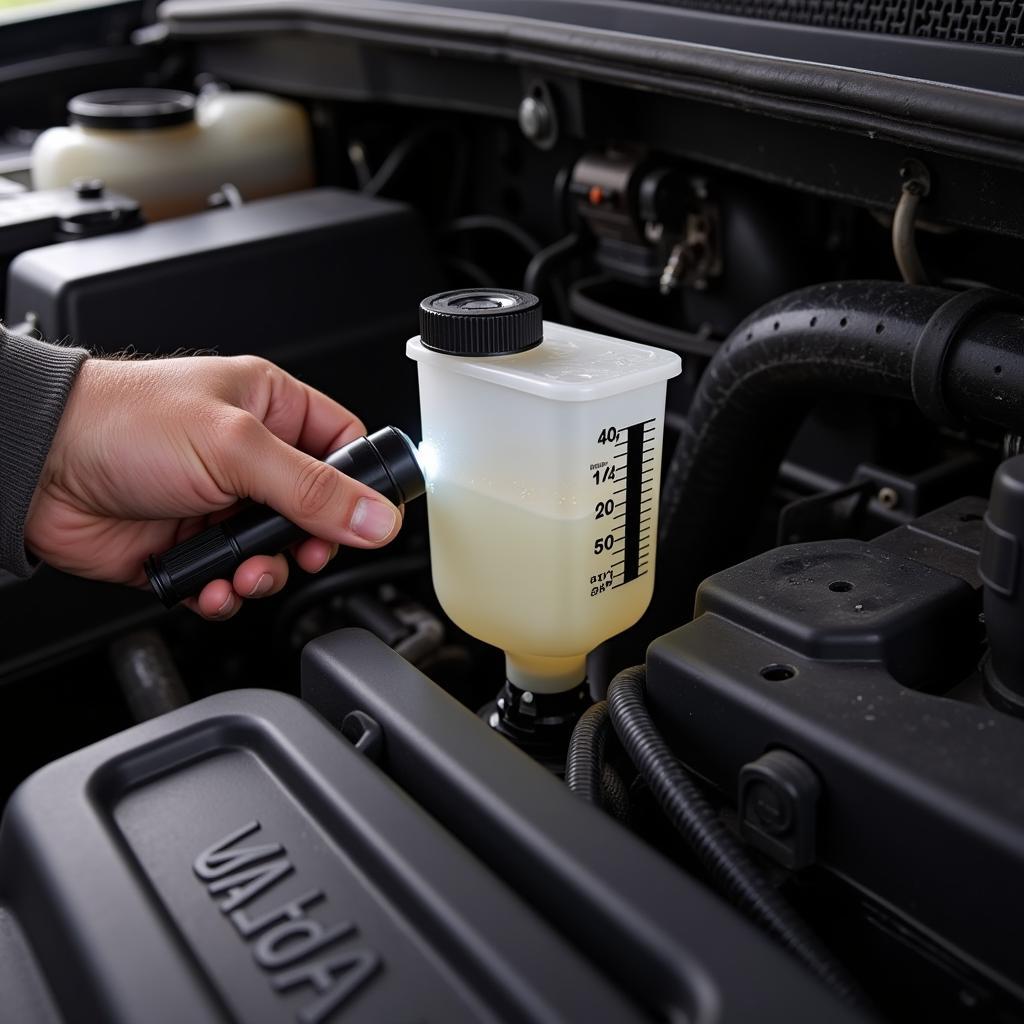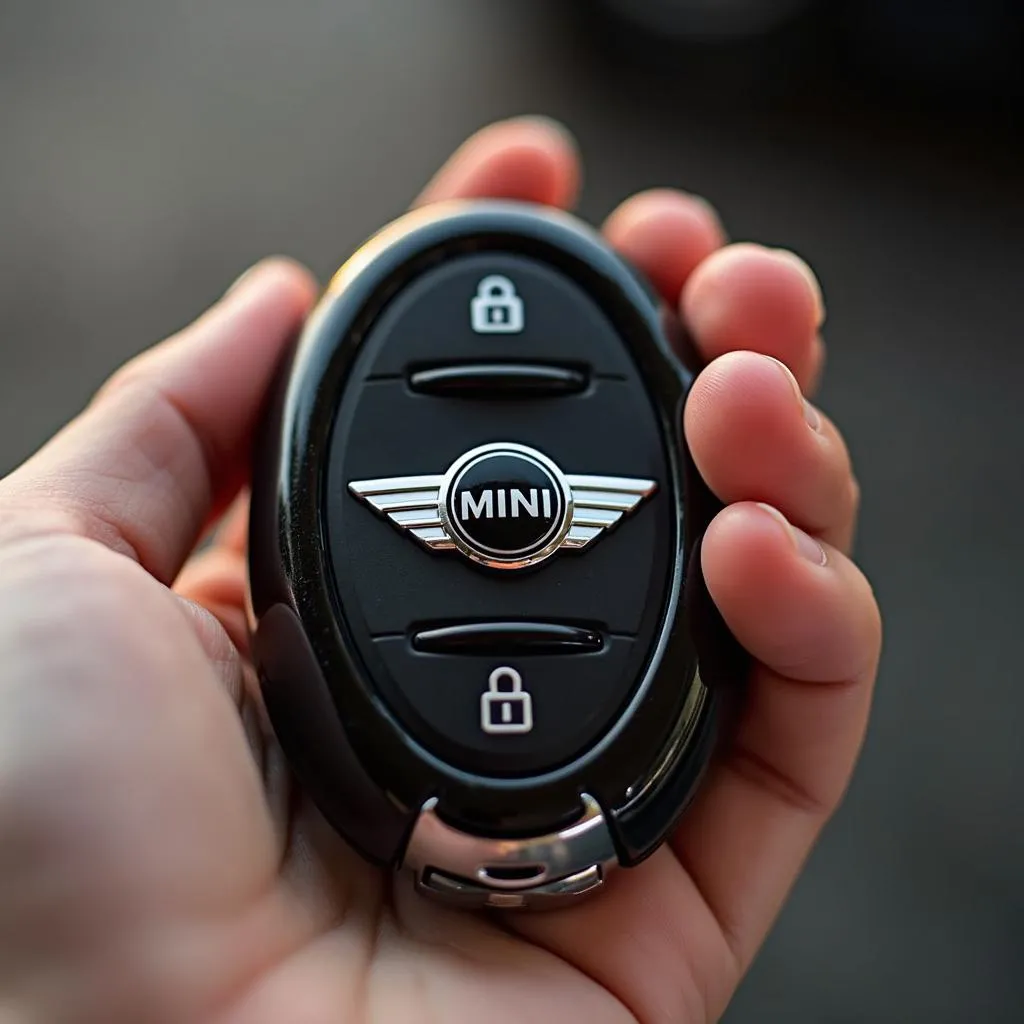The brake warning light on your Ford F150 is a critical safety feature. Ignoring it could lead to serious problems. This comprehensive guide will help you understand why your brake warning light Ford F150 might be illuminated and provide practical solutions for troubleshooting and fixing the issue.
If your Ford F150 brake warning light stays on, it’s a signal that something in your braking system requires attention. This could range from something as simple as low brake fluid to more complex issues like a faulty ABS sensor. Don’t panic! Many times, the fix is straightforward. This article will walk you through the common causes and solutions, empowering you to address the problem effectively. You can find more information in our article about when the ford f150 brake warning light stays on.
Common Reasons for a Ford F150 Brake Warning Light
Several factors can trigger the brake warning light in your Ford F150. Here’s a breakdown of the most frequent culprits:
- Low Brake Fluid: This is the most common cause. Brake fluid naturally depletes over time, and low levels can trigger the warning light.
- Worn Brake Pads: Brake pads wear down with use, and thin pads can activate a sensor that illuminates the warning light.
- Faulty Brake Sensor: Sometimes, the sensor itself can malfunction, triggering the light even if there’s no actual problem with the brakes.
- ABS Issues: Problems with the Anti-lock Braking System (ABS), such as a faulty sensor or module, can also illuminate the brake warning light.
- Parking Brake Engaged: Sometimes, the simplest explanation is the correct one. Ensure your parking brake is fully released.
- Master Cylinder Problems: The master cylinder is a crucial component of the braking system, and a leak or internal failure can cause the warning light to come on.
 Checking Brake Fluid Level in Ford F150
Checking Brake Fluid Level in Ford F150
Troubleshooting Your Ford F150 Brake Warning Light
Before rushing to a mechanic, you can perform some basic troubleshooting steps yourself.
- Check the Parking Brake: Ensure the parking brake is fully disengaged.
- Inspect Brake Fluid Level: Check the brake fluid reservoir. If the level is low, top it off with the correct type of brake fluid specified in your owner’s manual. However, consistently low fluid might indicate a leak, requiring professional attention.
- Visually Inspect Brake Pads: If you’re mechanically inclined, you can visually inspect your brake pads through the wheel spokes. Look for significant wear. If they appear thin, replacement is likely needed.
When to Seek Professional Help
While some issues can be resolved with simple DIY fixes, others require professional expertise. If you encounter any of the following, it’s best to consult a qualified mechanic:
- Brake Warning Light Stays On After Adding Fluid: This could indicate a leak in the braking system.
- Soft or Spongy Brake Pedal: This suggests a loss of brake pressure, potentially a serious safety concern.
- Grinding or Squealing Noises When Braking: These noises often indicate worn brake pads or other mechanical issues.
- Vehicle Pulling to One Side When Braking: This could signify uneven brake wear or a problem with the hydraulic system.
- ABS Light Illuminated Along with Brake Warning Light: This usually points to an issue within the ABS. For instance, a 2006 ford f150 brake warning light on along with the ABS light might require a specialized diagnostic tool.
Advanced Diagnostics and Remote Programming
Modern vehicles like the Ford F150 rely heavily on sophisticated electronic systems. Sometimes, the brake warning light can be triggered by software glitches or communication errors within these systems. In such cases, specialized diagnostic equipment and remote programming solutions can be incredibly effective. These tools allow technicians to identify and rectify software-related problems without extensive disassembly. If you suspect a software-related issue, consult a technician specializing in remote diagnostics and programming for Ford vehicles. For specific issues related to older models, refer to resources like the one available for a 20005 ford f150 brake warning light.
Why is My Brake Warning Light Flashing?
A flashing brake warning light usually indicates a more serious problem, often related to the ABS. It’s crucial to address this immediately.
How Can I Reset My Ford F150 Brake Warning Light?
The brake warning light should automatically reset once the underlying issue is resolved. However, in some cases, a diagnostic scan tool might be needed to clear any stored fault codes. If your truck is a 2013 model, you can refer to the information available for a 2013 ford f150 brake warning light.
“Addressing brake warning lights promptly is essential,” says automotive expert John Miller, ASE Master Technician. “Ignoring them can lead to more extensive and costly repairs down the line.” He emphasizes the importance of regular brake system maintenance to prevent unexpected issues.
Conclusion
The brake warning light on your Ford F150 brake warning light is a crucial safety indicator. Understanding its potential causes and taking appropriate action can prevent costly repairs and ensure safe driving. Don’t hesitate to seek professional help if you’re unsure about diagnosing or fixing the problem yourself. Regular maintenance and timely attention to warning signs will keep your Ford F150’s braking system in optimal condition. You can find helpful information regarding the brake warning light on a similar model, the 2004 ford fr50 brake warning light.
FAQ
- What should I do if my brake warning light comes on while driving? Pull over safely as soon as possible and assess the situation. Check your parking brake, brake fluid level, and look for any visible signs of problems. If you’re unsure, call a tow truck.
- Can I drive my Ford F150 with the brake warning light on? It’s not recommended. Driving with a brake warning light on could be dangerous, as it indicates a potential problem with your braking system.
- How much does it cost to fix a brake warning light problem? The cost varies depending on the underlying cause. A simple brake fluid top-up might be inexpensive, while more complex repairs, like replacing the master cylinder, can be significantly more costly.
- How often should I check my brake fluid level? It’s a good practice to check your brake fluid level at least once a month.
- What type of brake fluid should I use in my Ford F150? Consult your owner’s manual for the recommended brake fluid type. Using the wrong type can damage your braking system.
- Can a faulty ABS sensor cause the brake warning light to come on? Yes, problems with the ABS, including a faulty sensor, can trigger the brake warning light.
- How can I prevent brake warning light issues in the future? Regular brake system maintenance, including timely brake pad replacements and fluid top-ups, can help prevent future problems.

